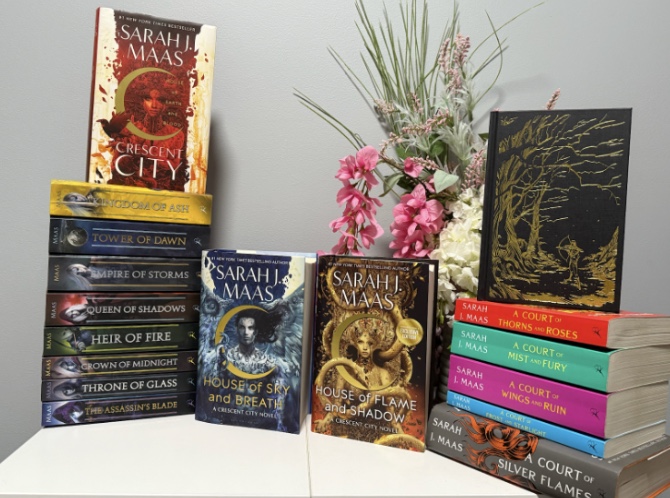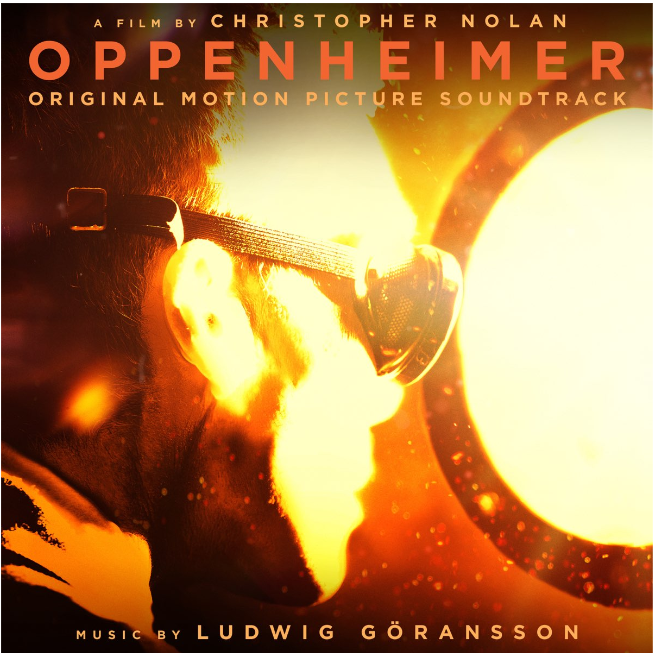Overall Rating: 8.7/10
This past summer, Christopher Nolan released his hit movie Oppenheimer. This greatly awaited movie surpassed the world’s expectations, and it brought a new liking of movie soundtracks and cinematographic music. Nolan’s partnership with Swedish composer Ludwig Göransson brought forth the Oppenheimer album.
1 “Fission” (9/10)
The first track starts off with different sounds climbing up to a crescendo. The transition of this crescendo to individual strokes of stringed instruments brings out an ethereal feel. However, it then builds up to an angsty sound, similar to a long note of a piano or a moment of confusion or fear in a movie. It ends with another crescendo that doesn’t build up, but rather comes in full-swing. The piano and violin work beautifully together, and have a very sensual feeling. To add on, the flute gives off the same vibes as the other instruments, since it is played as a transition from the staccato and legato notes of the piano. Overall, this song had many highs and lows in terms of sound and feel; in some moments it gave me feelings of fear and then in other moments it made me feel zen.
2 “Can You Hear The Music” (10/10)
Probably one of the most popular songs from Oppenheimer, “Can You Hear the Music” is a great example of cinematographic music. This piece gave me a vision of something important or life changing happening. “Can You Hear The Music” was used during the beginning of the movie and it begins with a very varied sound of violin. Sounds go up and down in high and low notes, and there’s a lot of other background instrumentals that increase the authenticity of the sound. The abrupt ending after the build-up was “chefs-kiss.” I truly understand why this song is considered one of the best throughout the whole album. It embodies both curiosity and the importance of certain actions.
3 “A Lowly Shoe Salesman” (9/10)
This composition starts off in a timid and sincere tone, low and in a way that shows new beginnings. It truly pays homage to the scene in the movie where we see Oppenheimer meet at the Princeton campus with Einstein and Strauss. It is a very dynamic, emotionally charged piece that starts off sincere and hopeful, and then gracefully transitions into a sound of sadness. This track was perfect for the scenes it went with and it truly showed me the power of sounds that influence a feeling.
4 “Quantum Mechanics” (7/10)
The fourth track begins with violin and a staccato beat in the background. The violin seems to be playing a few notes in repeat, then transitioning with different tones. Personally, I feel as though it played a slower rendition of “Can You Hear The Music.” The slight chorus and the chimes of tubular bells are very subtle, yet noticeable, which bring out a greater depth of the piece. Despite its great sound and smoothness, it isn’t as shocking as the other tracks.
5 “Gravity Swallows Light” (8/10)
“Gravity Swallows Light” starts off with a great amount of sound and it transitions to a high note on the violin. Throughout the beginning of the composition, there are lower, zen beats. The piece suddenly transitions to a combination of different sounds: fluttering, soft drums, violins, cello, echos, etc. This song is a composition of varying tones, both high and low, which bring out anticipation. Compared to the other songs, I found this sound to be the most different as I believe it used the most instruments.
6 “Meeting Kitty” (8/10)
This track starts off with mellow and low piano notes. In the movie, this is where we see Oppenheimer struggle with his marriage and his new life. We see his wife deal with what seems to be postpartum depression, and this piece is used to emphasize the important issues that the couple faces. Although the song seems entirely sad at first, it also transitions to a sound of understanding and slight realization. I can only assume that this change in sound was intentional, as it highlights the transition of Oppenheimer’s life. Personally, I found this song to be very meaningful and one that has a great impact on one’s experiences.
7 “Groves” (6/10)
Unlike the other pieces, “Groves” starts very low and has a series of chimes, beats, and echoes. It builds up in suspense, and there is a pattern of sound, which is steady yet different at the same time. There is also what seems to be a background chorus which is there to amplify the other instruments instead of shadowing them. It is good, but for me it was as forthcoming as the other ones.
8 “Manhattan Project” (10/10)
“Manhattan Project” starts with a sci-fi sound and a build up of violins. Strangely enough, there is a very deep emotiveness to the track. It evokes feelings ranging from adrenaline and excitement, yet sadness for what’s to come. I’m unsure if Ludwig Göransson did this intentionally or to show how the actual Manhattan Project was a scientific experiment that brought both excitement and fear for many involved. In my opinion this song truly depicts the feeling many scientists may have had down the road after making the atomic bomb.
9 “American Prometheus” (8/10)
A composition of violins begins this piece. “American Prometheus” begins slowly and builds up to a melody that is strong and profound. It plays with many angst elements as it goes back and forth on instruments and notes. True to the other tracks on this album, it seems to be a track truly made for Oppenheimer, since it is full of suspense and emotion. Personally though, I found this song to be short and not as impactive as the others. It failed to portray a specific feeling since there were many different sounds and parts of the short song.
10 “Atmospheric Ignition” (8/10)
Compared to the others on the track list, this composition begins with soft taps and clicks of what seems to be drumsticks. It then transitions to what seems to be a solo act of violin and chimes in the background. Throughout the piece, the notes are played in a low tone, which bring emphasis to the heavy feelings or moments in history that have to do with the atomic bomb. I believe this song is pretty well made, but not as eye-opening.
11 “Los Alamos” (9/10)
For some context, Los Alamos was the secret location where the atomic bomb was created. In this location, scientists were working everyday and they went through a lot of stress during this. A lot of this work was mentally straining as they were told to be extremely careful and secretive. This Oppenheimer piece perfectly composed those feelings as it begins slowly, and all of a sudden becomes louder and sensitive. It brings out a feeling of being in a place of immense importance and urgency. In my eyes, the song beautifully, yet hauntingly portrays what it must have been like to be a scientist at Los Alamos.
12 “Fusion” (9/10)
Immediately “Fusion” starts off with a beat of taps and cello. It takes a very serious tone, and uses instruments in a way which conveys a sense of rush. It feels as though you are running out of time, and as if there is a timer going off. This track uses the most bass and cello, which really bring out the different tones that range from dark, low, heavy, and emotional.
13 “Colonel Pash” (8/10)
The song begins with a staccato beat, skillfully including the sound of an untuned mic. Shifting to a low-frequency sound, similar to that of a violin, the song starts to blend varying tones and volumes, but in a way that doesn’t overwhelm the audience. The song concludes with a reflective tone, which really left an impact on me. I really enjoyed this complex song, but the beginning could strive to evoke more emotion.
14 “Theorists” (8/10)
The 14th song of the album begins with a sci-fi sort of feel, playing at a quieter volume. The unassuming sound quickly intensifies as more instruments are rapidly introduced. I found this song to be a subtle masterpiece of suspense. The complex melody layered with the sound of violins finalizing the piece made it overall enjoyable.
15 “Ground Zero” (8/10)
Unlike the other songs, “Ground Zero” conveys a very urgent feeling through a series of beats and chimes. Suddenly, it begins including solemn piano notes to evoke a sense of grief in the listener. This song perfectly illustrates the progression of grief from denial to depression.
16 “Trinity” (10/10)
The longest song off the Oppenheimer album, “Trinity” is a hauntingly beautiful piece. Predominantly utilizing the violin and chimes, you can clearly pick out the meticulously placed notes being used to paint a fantastical picture to listeners. I felt as though something astonishing was about to happen. Göransson truly outshines other composers with this piece as it is one of the most complex ones I have heard from the whole movie’s soundtrack.
17 “What We Have Done” (10/10)
This song takes a classical route, beginning with layered violins being played in dissonance. It takes on an eerie yet reflective tone, as if someone is looking back on their past mistakes or failures. I love the rendition this piece has to other songs I have heard such as Interstellar or Swan Lake.
18 “Power Stays In The Shadow” (7/10)
Straying from other instruments used throughout the album, this piece starts with the harp, while of course implementing the sound of violin. While conveying many deep emotions that one can connect with regret and depression, this song still has a very consistent sound to it. This piece didn’t strike me as shocking to the ears compared to the others.
19 “The Trial” (8/10)
“The Trial” steadily crescendos and decrescendos to exhibit suspense, or what one would feel as they stood in trial. This song depicts what it must have been like to explain your past, like J. Robert Oppenheimer had to as he explained his ties to the Soviet Union and to the Manhattan Project. However, it wasn’t very memorable.
20 “Dr. Hill” (10/10)
This song perfectly conveys the feelings of betrayal and regret, as Oppenheimer must have felt as he was essentially betrayed by many people he trusted. Getting kicked off of his own project due to his peers’ distrust as part of a revenge scheme from Strauss, the depth of this song makes it a hidden gem compared to the other pieces in the album.
21 “Kitty Comes To Testify” (10/10)
Like others, this piece begins solemnly, and with steady use of piano and violin. I still remember hearing this song in theaters, as I watched in anticipation what Kitty, Oppenheimer’s wife, would say during her testification. During the scene, we can see Kitty skillfully using her position as someone testifying to bring to light the harsh accusations brought upon her husband. Throughout the movie, female characters aren’t as prominent, but this scene perfectly shows how many women were impactful in Oppenheimer’s story. I truly love this scene, and the piece that played is one that truly left an impression.
22 “Something More Important” (8/10)
This piece also takes a classical route, as it is a complex piece that makes the listeners feel a sense of zen. I personally love the use of the violin in this piece, which outshines other instruments included in the song’s composition.
23 “Destroyer Of Worlds” (10/10)
The song begins with harp and violin, which establishes its peaceful tone. The song suddenly swells in suspense, conveying the scene where Oppenheimer realizes that he may have created a weapon that may destroy all of humanity. This song gave me and so many others goosebumps because of its creepy sound, truly illustrating the horrors of atomic weapons.
24 “Oppenheimer” (10/10)
The last song of the album pays homage to the name of the track list and to Oppenheimer himself. It takes on a melancholy tone, which connects to the portrayal of Oppenheimer’s emotions when creating the atomic. This song put a great end to an amazing album.
The Oppenheimer album truly is a masterpiece, and an album that will be revisited and appreciated for many years to come.







































